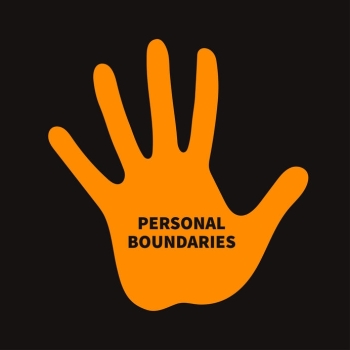
After identifying that you have a boundary that has been crossed it is essential to express your new needs to others. This tip is designed to help you walk through some general guidelines, tips, and suggestions for how to express your boundaries. It will provide you with some structure so you can have a conversation with about boundaries with your friend, family member, or partner. Throughout this tip, we will use the following boundary example to demonstrate how a specific conversation might flow. Imagine having a conversation where you will be telling a friend not to pressure you to make social plans because you have other commitments that need attention.
In preparation to have this conversation, take some time before expressing your boundaries to vent and process your feelings. Once you have fleshed out all sides of the equation to asserting a boundary, you are now ready to develop a concrete plan for what you want to say and how you want to say it. Being prepared and having a clear concise plan of points to share will be your best chance for communicating your needs calmly and effectively. Use the following questions as guidelines to structure what you will express and how you will express it.
How will the new boundary help you? What do you set to gain from setting this boundary? When you have the conversation about your boundary, you will need to outline the benefits you will get and your reasons for needing to protect your feelings. Your new boundary will help you to become closer in the long run if you feel like you can feel safe enough to express your true feelings. Be honest with yourself and your friend and make sure to share your reasons for needing boundaries. Following the example, of asking a friend to back off about social plans, you may need to express to her that you already have too much on your plate, with family and work commitments, that a social engagement would simply be too much. By saying no to going out with your friend, what will you get in return? Will you be afforded an evening to relax and de-stress, spend some quality time with family, or catch up on a project? To discuss these with a friend, simply state to her, “Thanks for the invitation to dinner; but I just can’t make it this week. I have too much going on that I’ll need that evening to catch up on rest, work, family time etc.” Alerting your friend of the benefit you need from backing off, will help her to see that you still value the relationship but that in this moment, you need some time off for your own well-being.
How may it hurt? You will also want to consider how setting the boundary could hurt you, the other person, and the relationship as a whole. Keep in mind that there are consequences to setting stricter boundaries. Asking a friend or partner to give you more space, may cause some discomfort for both of you for a while. The person you are sharing you new boundaries with may experience the conversation very differently than you intend. Your friend, family member, or partner may take the boundary personally, which can cause them to feel hurt, upset, sad, angry, or dismissed. They might test you, be frustrated, and lash out. A possible consequence of setting this boundary with your friend is that she may choose to walk away from the relationship if she feels like she can’t meet your needs or you can’t meet her expectations. While you need to be mindful that this situation could arise, you don’t have to take responsibility for the other person’s feelings and actions. Tell her it is not her fault that you need some time or space, and explain that you feel this new boundary will strengthen the relationship. By having boundaries you have identified what is not your issue. Then you have to let her go to work it out on her own. If your friend decides she can’t with this new boundary, one or both of us may need to decide if you can shift your boundary to accommodate the other person’s needs and expectations. Otherwise, walking away from the relationship may be necessary. Keep in mind that while boundaries protect you and your feelings, if boundaries are too strict and strong they will block out not only potential harm but also potential happiness and growth. Continue to reevaluate your boundaries and express changes as they apply.
Let’s use the example to discuss how to evaluate potential harm and consequences to expressing to a friend that you need time alone and away from social engagements. As you ask your friend to back off, she may feel like you are putting other things (family, work, other friends etc.) ahead of her and your relationship. This can cause her to feel hurt. Your friend might say something to you along the lines of “I feel like you are putting other things ahead of me and I don’t see how spending time apart will increase the value of this relationship.” Remember, you are not responsible for her feeling this way, nor if she acts on it, but you need to be aware this is a likely reaction. All you can do is remind her of the value you place on the relationship and empathize that what she is feeling is just as valid as your feelings. She will need to work through that on her own. Re-explain the reason and benefits you already identified and state to your friend, “This change is not because of you and I still value our time together. However, I feel I need to back off for a while until I have more time and energy to commit to us.” Your friend can tell you, “You’re not meeting my friendship needs though.” This is a consequence you will both need to assess and then address by shifting boundaries or walking away.
A twist; kill them with flattery: Another way to set the same boundary with your friend is to say “Thank you for the invitation to dinner, it sounds like so much fun. I’m honored that you would invite me to your house, unfortunately I can’t make it. Please keep me in mind the next time because I really enjoy spending time with you!”
In this version, you have set the same boundary. You said no. You are declining the dinner invite. The major difference is that you have neglected to offer any rational as to why you said no. Your focus has been on letting them know how wonderful they are, and how thoughtful their request was, and how much it means to you that they would extend themselves for you.
Flattery can be disarming to people. Now the person being rejected feels good about what they are offering. This is the behavioral approach to setting boundaries. You are simply drawing a boundary without emotionally or intellectually processing it with the other person. In this scenario of killing the other person with flattery, you only share your rationale as to why you can’t go if pressed for details. In most cases, someone might say “are you sure you can’t go?” and you simply respond with “No, I just can’t.” If someone says, “why not?” Then you will need to share your rationale.
Are there any barriers to asserting? Consider any barriers to asserting your boundaries. Do you find it difficult to share feelings with others? Is your friend, family member, or partner usually flexible or rigid when accepting feedback? Be prepared for any situation that can arise to disrupt asserting your boundary. As discussed earlier, consider the fact that a friend may take it personally. Know that all you can do is explain what you are truly feeling and why you need the boundary. If you are ready for potential barriers, you will be better able to handle them calmly and coolly in the moment to prevent distress.
A common barrier most people have when asserting boundaries is fear that the other person will become upset and that it is easier to just keep your mouth shut. It is necessary to understand that while it is uncomfortable to have someone upset with you, by not asserting you will be doing more long term damage. When you create a pattern of not asserting your needs and expectations no one will ever be able to meet them. Naturally resentment will build up and come out in passive aggressive ways. When you set a boundary and decide to work through the issues together, friendships grow deeper because you are allowing the person to know your bottom line. Asserting lets you be involved in relationship more cleanly because resentments and passive aggressive behavior won’t be muddling the good feelings. If you feel really concerned about any potential barriers, harm, or consequences that can come from your stricter boundaries, ask yourself, “Am I too strict or too over giving? Is the relationship worth over giving? Can I be “cleanly me” in this situation? Or Do I need to shift my perspective here?”
























